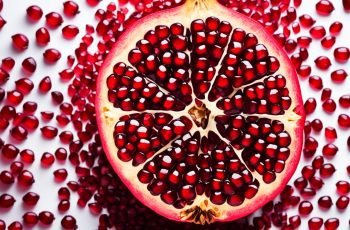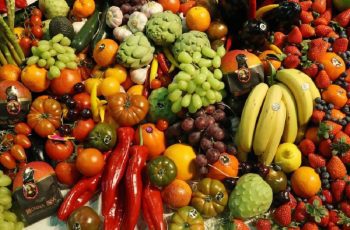Are you tired of feeling bloated and uncomfortable after meals? Well, you’re not alone. Bloating is a common issue that can be caused by various factors, including constipation, swallowing air, overeating, and certain medical conditions. But did you know that certain foods can also contribute to bloating? It’s true!
If you want to reduce bloating and enjoy a more comfortable digestive experience, incorporating bloating-reducing foods into your diet can make a big difference. By making conscious food choices, you can beat the bloat and feel your best. So, let’s dive into the top foods that can help reduce bloating.
Foods That Reduce Bloating
- Incorporating bloating-reducing foods into your diet can alleviate bloating and promote digestive health.
- Cruciferous vegetables like kale, broccoli, and cabbage contain a sugar called raffinose, which can cause gas and bloating.
- Legumes, such as beans, lentils, soybeans, and peas, are known for causing gas and bloating due to their high protein and fiber content.
- Lactose-containing dairy products can contribute to bloating, especially for individuals who are lactose intolerant. Opt for lactose-free or nondairy alternatives.
- High-carbohydrate foods, known as FODMAP foods, can lead to excess gas and bloating. Avoiding these foods and opting for low-FODMAP alternatives can help reduce bloating.
Cruciferous Vegetables: Kale, Broccoli, and Cabbage
When it comes to reducing bloating, cruciferous vegetables like kale, broccoli, and cabbage are excellent choices. Although these vegetables contain raffinose, a sugar that can cause gas and bloating, they offer numerous health benefits that can promote a healthier digestive system.
Eating nutrient-rich, high-fiber foods like kale, broccoli, and cabbage consistently can strengthen your digestive system and make it less prone to bloating. These vegetables are packed with vitamins, minerals, and antioxidants that support overall gut health.
To make cruciferous vegetables easier to digest, consider steaming them. Steaming softens the fiber and shrinks the portion, making them more manageable for your digestive system. Although cooking cruciferous vegetables may not eliminate bloating entirely, it can significantly improve their digestibility.
By incorporating these cruciferous vegetables into your diet, you can enjoy a wide range of health benefits while reducing the likelihood of bloating. So next time you plan your meals, remember to include kale, broccoli, and cabbage to support a healthy and comfortable digestive experience.

Legumes: Beans, Lentils, Soybeans, and Peas
When it comes to reducing bloating, legumes are often seen as the culprit due to their high protein and fiber content. However, incorporating legumes like beans, lentils, soybeans, and peas into your diet can actually help your body adjust to the fiber and minimize the effects of bloating over time.
One way to make legumes more digestible is by combining them with easily digestible whole grains like rice or quinoa. This combination allows your body to gradually adapt to the fiber content, reducing the likelihood of experiencing bloating and gas. Additionally, drinking plenty of water while consuming legumes can aid in their digestion and prevent discomfort.
Regularly including legumes in your meals is key to reaping their bloating-reducing benefits. You can enjoy them in soups, stews, salads, or even as the main protein source in vegetarian dishes. Experimenting with different recipes and cooking methods can help you find the most enjoyable and flavorful ways to incorporate legumes into your diet.

Overall, while legumes may initially cause gas and bloating, consuming them consistently and in combination with easily digestible whole grains can help your body adjust and reduce symptoms. By including legumes in your diet, you can enjoy the nutritional benefits they offer while minimizing discomfort. Remember to stay hydrated, listen to your body, and make gradual changes to your diet to ensure long-term success in reducing bloating.
Lactose-Containing Dairy Products
Lactose-containing dairy products can contribute to bloating, especially for individuals who are lactose intolerant. Lactose intolerance occurs when the body lacks the necessary enzymes to break down lactose, resulting in gas formation in the gastrointestinal tract and bloating.
If you experience bloating after consuming dairy products, it may be beneficial to avoid them and opt for lactose-free or nondairy alternatives. These alternatives provide similar taste and texture without the lactose content that can cause discomfort. Many supermarkets now offer a wide range of lactose-free options, including milk, cheese, and yogurt.
In addition to lactose-free alternatives, some individuals find relief by taking lactase tablets such as Lactaid. These tablets contain the enzyme lactase, which aids in the digestion of lactose-containing foods. Taking a lactase tablet prior to consuming dairy products can help break down lactose more effectively, reducing the likelihood of bloating.
It’s important to listen to your body and identify any specific triggers that may be causing bloating. If you suspect lactose intolerance, consider consulting with a healthcare professional or registered dietitian for further guidance and personalized recommendations.
FODMAP Foods: High-Carbohydrate Foods to Avoid
FODMAP foods, which stands for fermentable oligosaccharides, disaccharides, monosaccharides, and polyols, are a group of carbohydrates that the small intestine cannot fully absorb. When these undigested carbohydrates accumulate in the intestines, they can lead to excess gas and liquid, resulting in bloating. To reduce bloating, it’s important to avoid high-carbohydrate foods that are rich in FODMAPs.
Examples of high-FODMAP foods include certain fruits such as apricots, cherries, and peaches, which can be difficult for some people to digest. Other high-FODMAP foods include watermelon, artichokes, beets, onions, and peas. These foods have a high carbohydrate content that can contribute to bloating.
To reduce bloating and discomfort, it’s recommended to opt for low-FODMAP foods instead. These include avocados, cucumbers, bananas, and rice. These foods are lower in fermentable carbohydrates, which can help alleviate symptoms of bloating.
By avoiding high-carbohydrate FODMAP foods and incorporating low-FODMAP options into your diet, you can effectively reduce bloating and improve digestive comfort.
Conclusion
Bloating is a common issue that many people experience, but there are natural solutions that can help alleviate the discomfort. By incorporating bloating remedies through food, you can effectively reduce bloating and promote digestive health.
One effective approach is to focus on anti-bloating foods that alleviate bloating. Cruciferous vegetables like kale, broccoli, and cabbage contain raffinose, a sugar that can contribute to bloating. However, regularly consuming these vegetables can actually strengthen your digestive system and lessen the likelihood of bloating.
Legumes such as beans, lentils, soybeans, and peas are also known to cause gas and bloating due to their high protein and fiber content. However, when combined with easily digestible whole grains and consumed consistently, legumes can help your body adjust to the fiber content and reduce bloating symptoms.
Additionally, opting for low-lactose dairy alternatives and low-FODMAP foods can further aid in reducing bloating. Lactose-containing dairy products can contribute to bloating, particularly for those who are lactose intolerant. Similarly, FODMAP foods high in fermentable carbohydrates can accumulate in the intestines and lead to excess gas and bloating. By avoiding these foods and choosing low-lactose and low-FODMAP alternatives, you can help alleviate bloating and promote digestive comfort.
Remember to stay hydrated, chew your food thoroughly, and incorporate probiotics into your diet to support a healthy digestive system. By making conscious food choices and following these natural remedies, you can beat bloating and enjoy a more comfortable digestive experience.
FAQ
What are some foods that reduce bloating?
Some foods that can help reduce bloating include cruciferous vegetables like kale, broccoli, and cabbage, legumes such as beans, lentils, soybeans, and peas, as well as low-lactose dairy alternatives and low-FODMAP foods like avocados, cucumbers, bananas, and rice.
How can cruciferous vegetables like kale, broccoli, and cabbage help reduce bloating?
Cruciferous vegetables contain raffinose, a sugar that can cause gas and bloating. However, regularly consuming these nutrient-rich, high-fiber foods can lead to a stronger and healthier digestive system that is less prone to bloating. Steaming these vegetables can also make them more digestible.
How can legumes like beans, lentils, soybeans, and peas help reduce bloating?
While legumes can cause gas and bloating due to their high protein and fiber content, regularly consuming them and combining them with easily digestible whole grains can help your body adjust to the fiber content and reduce symptoms of bloating.
Can lactose-containing dairy products contribute to bloating?
Yes, lactose-containing dairy products can contribute to bloating, especially for individuals who are lactose intolerant. Lactose intolerance occurs when the body lacks the necessary enzymes to break down lactose, resulting in gas formation in the gastrointestinal tract and bloating. It is advisable for those experiencing bloating to avoid dairy products and opt for lactose-free or nondairy alternatives.
What are FODMAP foods, and how can they contribute to bloating?
FODMAP foods are high in fermentable oligosaccharides, disaccharides, monosaccharides, and polyols, which are carbohydrates that the small intestine cannot fully absorb. These undigested carbohydrates can accumulate in the intestines, leading to excess gas and liquid and resulting in bloating. High-FODMAP foods to avoid include certain fruits such as apricots, cherries, and peaches, as well as watermelon, artichokes, beets, onions, and peas.
What are the best foods to help alleviate bloating?
Some of the best foods to help alleviate bloating include cucumbers, asparagus, bananas, papaya, fennel, and ginger. These foods can promote regularity, aid in digestion, and relieve discomfort associated with bloating.




